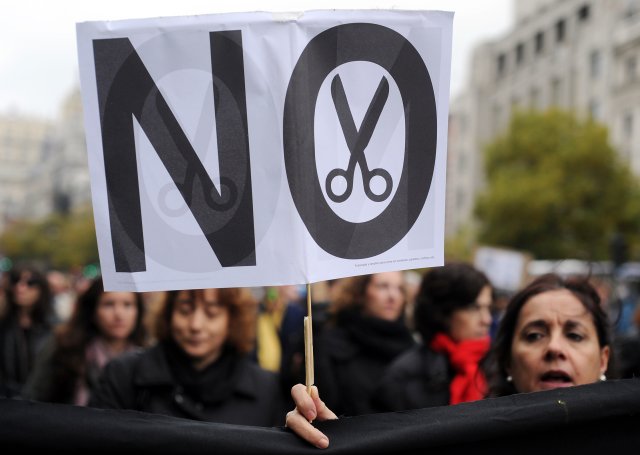
The manifesto below was developed to promote a vision for a “plan B” against austerity and the assault on democracy by European elites. It has been signed by dozens of activists, academics and political figures, including former Greek finance finance minister Yanis Varoufakis, Barcelona mayor and housing rights activist Ada Colau, former Greek parliamentary speaker Zoe Konstantopoulou, British film maker Ken Loach and renown intellectual Noam Chomsky.
You can see the full list of signatories to the declaration, add your name and to find out more about the proposed conference by visiting planbeuropa.es.
* * *
In July 2015, we witnessed a financial coup d'etat carried out by the European Union and its institutions against the Greek government, condemning the Greek population to continue suffering the austerity policies that had been rejected on two occasions in the polls.
This coup has intensified the debate over the power of the European Union, and by extension its institutions, its incompatibility with democracy and its role as guarantor of the basic human rights demanded by European citizens.
We know that there are alternatives to austerity. Manifestos such as “For a Plan B in Europe”, “Austerexit” or Democracy in Europe Movement 2025 denounce the blackmail of the “third memorandum of understanding” austerity program imposed against Greece, the catastrophe that it would cause and the antidemocratic nature of the EU.
No less than the president of the European Commission, Jean-Claude Juncker, said: “There can be no democratic decision against European treaties.”
We are also witnesses to the unsupportive, and at times xenophobic, response from members of the EU and its institutions, to the arrival of refugees from the Middle East and Africa and to the human drama that entails.
Underlining the hypocrisy of the debate within the EU with respect to the humanitarian disasters is the indirect way in which, through the sale of arms or by pushing its trade policies, the EU has been a key player in the conflicts that have in turn provoked recent humanitarian crises.
The EU's solution to the crisis, started eight years ago and based on austerity, privatises common goods and destroys social and labour rights instead of addressing the root causes of the crisis: deregulation of the financial system and the corporate takeover of EU institutions through the employment of powerful lobbies and revolving door policies.
The EU promotes false solutions by negotiating trade and investment treaties, with hardly any transparency or democratic oversight, such as the Transatlantic Trade and Investment Partnership (TTIP), Comprehensive Economic Trade Agreement (CETA) or Trade in Serves Agreement (TISA), that eliminate what are considered to be barriers to trade: the rights and regulations that protect citizens, workers or the environment.
It is the final blow to our democracies and rule of law, especially regarding the procedures put in place for so called investor protection
The current EU is governed by a de facto technocracy serving the interests of a small, but powerful, minority of economic and financial powers. This has provoked a resurgence of rhetoric from the far right as well as from xenophobic and nationalist factions in many European countries.
We have the responsibility to react against this threat and stop fascists from capitalising on the pain and unhappiness of citizens, who in spite of everything have shown solidarity towards the hundreds of thousands of refugees that are suffering this humanitarian tragedy.
Society has now started to work towards a radical change in the policies of the EU. Social movements, such as Blockupy, the campaign against the TTIP agreement between the European Union and the United States), the Alter Summit, the European general strike in 2012, the Euromarches, or the huge amount of work carried out by many citizen groups and NGO's make up valuable human, intellectual and ideological capital in the defence of human rights, the respect of the Earth, and of the dignity of people over and above political and economic interests.
However, we believe that better coordination and cooperation is needed to mobilise at a European level.
There are many proposals on the table that could do away with austerity: a fair tax policy and the closure of tax havens; complementary exchange systems; the re-municipalisation of public services; the equal distribution of all jobs and enshrining fair conditions; commitment to a production model based on renewable energies; and reform or abolish the EU tax treaties – formally known as the Treaty on Stability, Coordination and Governance in the Economic and Monetary Union.
The example of Greece has shown us that in order to face the current circumstances, we must join forces, with all the member states and from all their spheres: political, intellectual and civil society. Our vision is all-inclusive and international.
To carry out all these proposals in order to redefine and re-establish political and European institutions and treaties, civil society must be organised. We must think about our common strategies and see how to articulate them. We know that these transformations cannot be done in isolation from each of the European countries. Our vision is of solidarity and internationalist.
For this reason, we want to create a convergence of all the people, movements, and groups that oppose the current model of the EU and agree to a common agenda of objectives, projects and actions, with the aim of breaking the EU-wide system of austerity and to radically democratise the European institutions, putting them to work for the citizens.
With this idea in mind, we propose to set up a European conference on February 19-21 in Madrid and we invite everyone to participate in the debates, workshops and discussions that will take place.
Like the article? Subscribe to Green Left now! You can also like us on Facebook and follow us on Twitter.